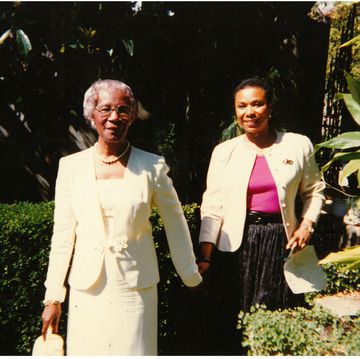Each day in the Trump era kicks off with its own horrific realization. Consider: We now live in a world where the President of the United States could start a nuclear war with a nickname that Elton John coined.
During Trump’s first address to the United Nations this week, he mocked North Korean leader Kim Jong-un, whom he has been taunting for weeks, and proved that he does indeed intend to call him “Rocket Man” for the foreseeable future.
“Rocket Man is on a suicide mission,” Trump said in real words that leaders all over the world could and did hear.
But Trump didn’t only threaten Kim; Trump made sure to directly threaten war: “If [the US] is forced to defend itself or its allies, we will have no choice but to totally destroy North Korea,” quoth Trump. And in a speech where you've already done your level best to push the leader of a nuclear nation toward his most catastrophic instincts, it’s a good idea make sure all your allies know you think they’re useless, weak jerks. This, too, Trump accomplished, affirming that “we can no longer be taken advantage of, or enter into a one-sided deal [with other nations] where the United States gets nothing in return. As long as I hold this office, I will defend America’s interests above all else.” For those of us who believe that America’s interests include not being consumed by nuclear hellfire, it was a hollow promise.
But of course, this wasn’t the only time Trump has gotten himself in trouble by compulsively taunting a perceived threat. It wasn’t even the first time this week. Careful observers will note that the “Rocket Man” moniker also showed up in Trump’s Saturday morning tweetstorm — the one that gave rise, God help us, to the Donald Trump Golf GIF Scandal.
The story, as far as one can parse it without being overtaken by the urge to throw one’s laptop down a ravine, goes as follows: Donald Trump was in the midst of his usual weekend tweet routine when he felt the compulsive need to comment on Hillary Clinton. This, he did by RT’ing Twitter user @fuctupmind (user name: “NY TIMES SUCKS”), who had posted a doctored GIF that made it appear Donald Trump hit a golf ball into Hillary Clinton’s back and knocked her over. Here is the GIF and/or extremely dignified Twitter handle in question:
Which, in sum, is why we now live in a world where this is a real headline:
And this:
Human lives depend on this man:
Reactions to the GIF tended to focus on the implied threat of violence toward a woman and political rival — the idea that Trump might like to hit Hillary Clinton to shut her up. But that’s hardly a revelation. A year ago, Trump seemed to hint that “Second Amendment people” could shoot her. What stands out now is less than the individual sentiment, than the fact that it’s yet another example of the endless freedom Trump has to shoot his mouth off, especially compared to the woman he’d so like to keep quiet.
What Happened, Clinton’s memoir whose success perhaps motivated his Twitter rant, is dominated by permutations and variations on the phrase “should have said.” In politely greeting Sen. Jason Chaffetz (R-UT), only to find out he’d tweeted “so pleased she is not the President” immediately afterward: “I came this close to tweeting back ‘to be honest, I thought you were Reince.’” (She didn’t Tweet him back.) On being stalked by Donald Trump at the second debate: “Do you stay calm, keep smiling, and carry on as if he weren’t repeatedly invading your space? Or do you turn, look him in the eye, and say loudly, ‘back up, you creep’… I chose Option A.” (She now writes that she “should have chosen Option B.”) On being obsessively questioned about her emails at a foreign policy forum: “I should have said, ‘You know, Matt, I was the one in the Situation Room advising the President to go after Osama bin Laden. I was with Leon Panetta and David Petraeus urging stronger action in Syria sooner. I worked to rebuild Lower Manhattan after 9/11 and provide health care to our first responders. I’m the one worried about Putin subverting our democracy. I started the negotiations with Iran to prevent a nuclear arms race in the Middle East. I’m the one national security experts trust with our country’s future.’ And so much more.”
So much more indeed. Clinton’s book describes a woman forced to live for several decades inside a rhetorical corset; every word measured, every instinct checked and double-guessed and focus-grouped into oblivion, all so she won’t alienate voters by sounding too female. It’s not that her paranoia is off-base. Anything but. Clinton spends pages upon pages discussing a famous “gaffe” that consisted solely of slipped pronoun: she said “we are going to put a lot of coal miners out of business,” when what she meant was something like “the market will” or “humanity, in the act of switching away from fossil fuels, will.” That one bad sentence construction dominated her media coverage, despite the fact that she’d screwed up while describing her extensive jobs and relief plan for coal miners. Clinton really did have to weigh and calibrate every word that came out of her mouth. Any mistake she made, no matter how minor, would be treated like a catastrophe.
But after all that work, she lost the election to a toddler who can barely put together a full sentence.
We can talk for ages — and experts have — about how our norms of public speech are set up to reward men and punish women. We can talk about how people believe women are dominating a conversation when they’re merely getting equal time, how we only perceive certain vocal tics and habits (upspeak, vocal fry, etc.) as problematic when we associate them with femininity, how women have historically been shamed out of the public sphere through attacks on their voices. Hell, we could even talk about how the whole Western idea of “eloquence” was created by and for men: “Masculine speech is the cultural standard,” wrote JSTOR last year, summing up the research of communication studies professor Joshua Gunn and the experience of every woman who’s opened her mouth. “It’s what we value and respect. The low pitch and assertive demeanor that characterize the adult male voice signify reason, control, and authority, suitable for the public domain.”
But the academic dimensions of this don’t convey the sheer, maddening reality of it: A woman can obsess over not only what she wants to say, but how to say it in a way people will be willing to hear. She can live, as Clinton evidently does, in a constant self-reflexive loop of checking and adjusting her voice, of subjecting every word choice to an endless process of second-guessing. And then, at the end of all that, her white, male opponent can shout his way to the top and be praised for it.
There’s no easy fix to all this — at least not until we alter our culture’s norms so that “feminine” qualities and voices are just as authoritative as men’s. But one thing is clear: Female silence isn’t working. Just look at Hillary Clinton: The things she wishes she’d said can, quite literally, fill a book. Or, for that matter, look at her former opponent. We may have to die in tweet-induced nuclear war to realize it, but as it turns out, being a man who speaks his mind doesn’t automatically make you a competent leader, after all.













